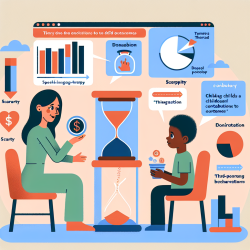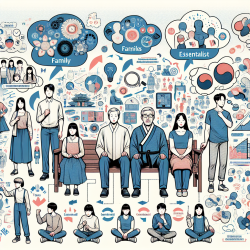Introduction
The intersection of climate change and mental health is a burgeoning area of concern, particularly for young people who are disproportionately affected by the climate crisis. The research article, "Climate emergency, young people and mental health: time for justice and health professional action," highlights the urgent need for health professionals to adopt a proactive stance in addressing these challenges. This blog explores how practitioners can enhance their skills and contribute to positive outcomes for children by integrating the insights from this research into their practice.
Understanding the Impact
Climate change is not just an environmental issue; it is a public health emergency with profound implications for mental health. Young people, who are in critical stages of psychological development, face an unprecedented existential threat that contributes to mental distress. Terms like "ecoanxiety" and "solastalgia" have emerged to describe the psychological impacts of environmental changes. Health professionals must recognize these unique stressors and their implications for youth mental health.
The Call for a Broader Conception of Health
The research advocates for a broader conception of health that includes a "social lens," recognizing the interplay between individual health and larger social, economic, and political systems. This perspective encourages health professionals to consider the broader determinants of health and to engage in socially conscious practices that address the root causes of climate-induced mental health issues.
Actionable Steps for Health Professionals
Health professionals can take several actionable steps to address the mental health impacts of climate change on young people:
- In the Clinic: Obtain comprehensive social histories and create a safe space for young people to express their concerns about climate change. Reconsider diagnoses within the context of social and environmental factors.
- Local Services: Collaborate with local stakeholders to develop community-level solutions and advocate for sustainable practices within health services.
- Larger Community Engagement: Use your social capital to advocate for systemic change, support climate action initiatives, and engage in public discourse to raise awareness.
Building a Framework for Action
The research provides a preliminary framework for health professionals to engage in climate activism. This includes integrating climate considerations into clinical practice, supporting local initiatives, and leveraging professional influence to advocate for policy changes. By adopting this framework, health professionals can play a pivotal role in mitigating the mental health impacts of climate change on young people.
Conclusion
As health professionals, we have a responsibility to address the climate crisis and its impact on youth mental health. By adopting a social lens and taking concrete actions, we can contribute to a healthier, more equitable future for the next generation. The time to act is now, and together, we can make a difference.
To read the original research paper, please follow this link: Climate emergency, young people and mental health: time for justice and health professional action.










